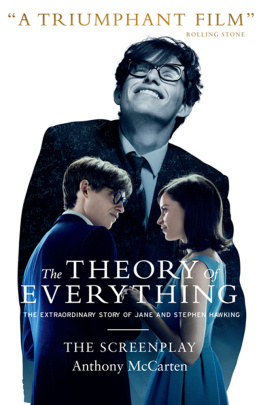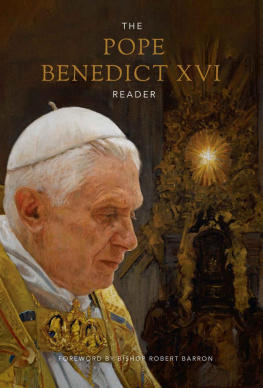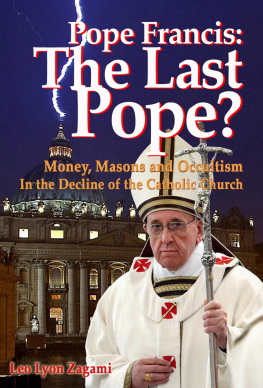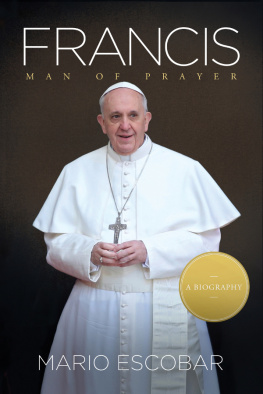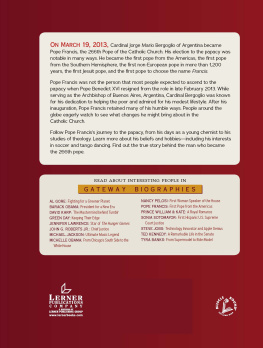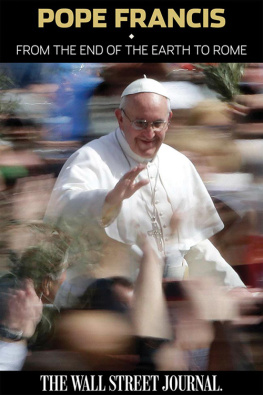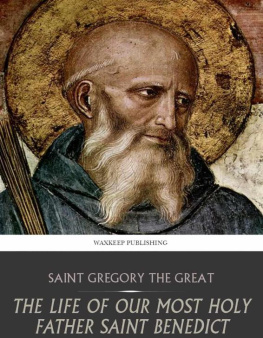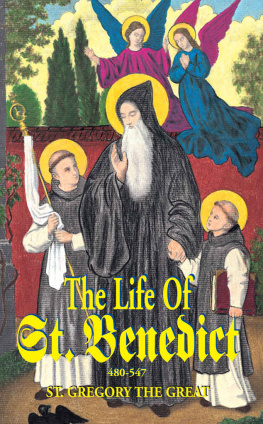Anthony McCarten - Pope: Francis, Benedict, and the Decision That Shook the World
Here you can read online Anthony McCarten - Pope: Francis, Benedict, and the Decision That Shook the World full text of the book (entire story) in english for free. Download pdf and epub, get meaning, cover and reviews about this ebook. year: 2019, publisher: Macmillan, genre: Religion. Description of the work, (preface) as well as reviews are available. Best literature library LitArk.com created for fans of good reading and offers a wide selection of genres:
Romance novel
Science fiction
Adventure
Detective
Science
History
Home and family
Prose
Art
Politics
Computer
Non-fiction
Religion
Business
Children
Humor
Choose a favorite category and find really read worthwhile books. Enjoy immersion in the world of imagination, feel the emotions of the characters or learn something new for yourself, make an fascinating discovery.

- Book:Pope: Francis, Benedict, and the Decision That Shook the World
- Author:
- Publisher:Macmillan
- Genre:
- Year:2019
- Rating:4 / 5
- Favourites:Add to favourites
- Your mark:
- 80
- 1
- 2
- 3
- 4
- 5
Pope: Francis, Benedict, and the Decision That Shook the World: summary, description and annotation
We offer to read an annotation, description, summary or preface (depends on what the author of the book "Pope: Francis, Benedict, and the Decision That Shook the World" wrote himself). If you haven't found the necessary information about the book — write in the comments, we will try to find it.
Pope: Francis, Benedict, and the Decision That Shook the World — read online for free the complete book (whole text) full work
Below is the text of the book, divided by pages. System saving the place of the last page read, allows you to conveniently read the book "Pope: Francis, Benedict, and the Decision That Shook the World" online for free, without having to search again every time where you left off. Put a bookmark, and you can go to the page where you finished reading at any time.
Font size:
Interval:
Bookmark:
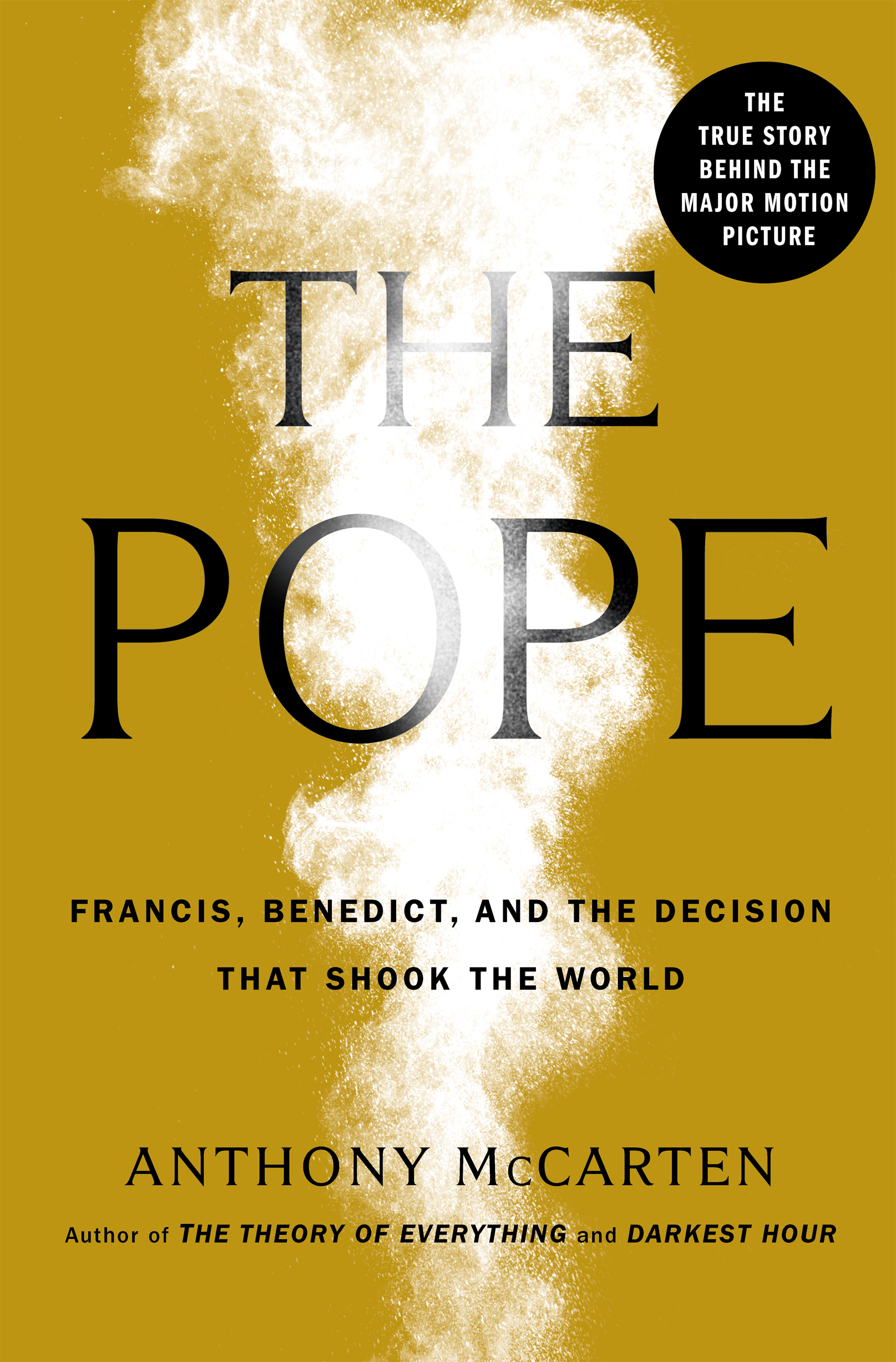

The author and publisher have provided this e-book to you for your personal use only. You may not make this e-book publicly available in any way. Copyright infringement is against the law. If you believe the copy of this e-book you are reading infringes on the authors copyright, please notify the publisher at: us.macmillanusa.com/piracy.
For my parents: my mother, whose lasting wish was to ride around Heaven on a motorcycle; my father, whose last instruction to me was to keep the faith; and for Eva, who showed me the view of Rome from the Villa Borghese.
On February 11, 2013, a seven-hundred-year-old tradition was shattered: Pope Benedict XVI, former protector of doctrine and loyal heir of the long-suffering John Paul the Great, made a startling announcement. After eight years in the papacy, he would, owing to his advanced age, resign, but would retain the title of Pope Emeritus for his lifetime.
Within weeks, the great doors of the Sistine Chapel in the Vatican were sealed and the cardinals, drawn into conclave for the second time in less than a decade, were asked to choose a new spiritual leader for the Catholic Churchs 1.28 billion followers. When the doors opened again a few days later, the charismatic Argentinian Jorge Bergoglio, who would take the name Francis, had been elected. The world, for the first time since the year 1415, had two living popes.
The reasons for Benedicts cataclysm became fodder for speculation. A pope, surely, must die on the job. Wasnt this an integral part of the job description? Not just tradition; it was virtually dogma. As The Washington Post, citing a theological expert, explained: Most modern popes have felt that resignation is unacceptable except in cases of an incurable or debilitating diseasethat paternity, in the words of Paul VI, cannot be resigned.
Pope Benedicts resignation was not entirely unprecedented, nor was the dilemma of two living popes. In the long history of the church, three popes have now resigned, while 263 did not. Pope Gregory XII resigned in 1415 in the midst of a political struggle between Italy and France over who really controlled the Catholic Church. But we have to return to 1294, to Celestine V, to find a pope who decided, of his own volitionout of a longing for the tranquility of his former lifeto step down.
The reaction at the time to Celestines bombshell was outrage. There is a passage from the third canto of the Inferno, in Dantes Divine Comedy, where Virgil is guiding Dante through the Gates of Hell. Before they reach the Inferno they pass into an antechamber filled with a cacophony of agonizing cries of those miserable souls who lived a life without disgrace and without praise; in effect, people worse than sinners, who had failed to act, failed to believe, or failed to deliver on promises made. Dante stares at the doomed faces of the terminally bland until, at one point, he sees a man and writes: I saw and recognized the shade of him who made, through cowardice, the great refusal. That man was, of course, Pope Celestine V, whose defection so horrified the great Italian poet that he immortalized him in his magnum opus.
So, knowing the outrage a papal resignation would cause, why did Benedict, the most traditional pope of the modern era, do the most untraditional thing imaginable? Poor health alone is not seen as a valid explanation; in fact, it has usually been an asset to a pope, in that it reenactsfor all to seeChrists suffering on the cross. An additional mystery has to be sorted: How could this ultraconservative protector of the faith, guardian of doctrine, even contemplate resigning when, as he very well knew, he would be surrendering the Chair of St. Peter to the radical Jorge Bergoglio, a man so different from him in character and views?
This book tells the tale of two popes, both possessed of tremendous and inalienable authority: an odd couple whose destinies converged and who influenced each other profoundly.
Let us consider Benedict first, the former Cardinal Joseph Ratzinger, an intellectual German, suspicious of humor, a luxury-savoring introvert and somewhat dandyish dresserhe revived the papal tradition of wearing red velvet slippers, and commissioned and sported a perfume maker to create a signature fragrance for his sole usewho feels the churchs refusal to yield and change is its greatest strength and is, indeed, the secret of its timeless durability. While sincere about his sacred duties, hes a man completely lacking the common touch. A reclusive theologian wholly without in-the-field experience. Not known to be a fan of any sport. Has never, to our knowledge, spoken a romantic word to another soul.
Francis, on the other handor, as we will first encounter him, Cardinal Bergogliois a charismatic, fun-loving Argentinian, on the surface a humble man, an extrovert, a simple dresser (he wore the same pair of black shoes for twenty years, still wears a Swatch), and an on-again, off-again advocate of liberation theology, a Catholic movement that seeks to aid the poor and oppressed through direct involvement in political and civic affairs. Hes a man with the common touch. A man of the people. Once even had a girlfriend. Worked as a bouncer at a tango club. An ardent fan of football.
Sin is a theme in both mens lives, more specifically the grace and extra wisdom that come if a sinner can acknowledge their failings and put their sins behind them. How much wiser, how much more valuable as a future teacher and healer and guide, is the person who has a full, firsthand understanding of a particular human weakness or failing or problem, and who has then risen from this place of dark insight to see the true dimensions of this problem. Alternatively, how much less valuable, and even more dangerous, the one who has failed in this regard.
Jorge Bergoglio openly labels himself a sinner, continually points out that this is not some euphemism, some mere turn of phrase. He has sinned. He goes even further, controversially stating that it is not enough to enact the ritual of confession of sins to a priest. One must take practical steps to atone for those sins in ones daily life, make real and deep changes. No one gets a clean scorecard with just a quick visit to a priest in his confessional. One must act. As he has said, Sin is more than a stain that can be removed by a trip to the dry cleaner. It is a wound that needs to be treated, healed.
This logic suggests a true reformist agenda, one that, if permitted, would reach naturally into many other areas of belief and doctrinal teaching. Why, for instance, should a celibate priest feel confident to lecture on sexual matters? Surely the church ought, with similar frankness, to admit that it is not best qualified to impose its views in this arena. How should such celibate, sex-denying men judge their sexually active parishioners, whose experience of life will be much more complete and varied than theirs? As Frank Sinatra once quipped, Your Holiness, you no play-a da game, you no make-a da rules. Or how, for instance, can a celibate novice on the day of his ordination, when asked to renounce sex for the rest of his life, be wise enough to know what he is saying no to? He cannot know. If this naf has never explored his own sexual drives, what is he to do should these drives one day make themselves felt? Like so many before him, he will be forced into a double life, with sometimes disastrous consequences, and sometimes many innocent victims. And what makes the church fit to say that only celibate men are fitting vessels for teaching from the pulpit Gods ministry? Also, if the story of Adam and Eve is, as Francis has said, merely a parable, not at all to be taken as literal fact, thus pouring considerable water on the whole seven-day creation myth, what else of the sacred scriptures ought to be considered make-believe? Is even the story of Christ rising from the dead and ascending bodily into Heaven also now only a parable? If the spirit of Franciss frankness is logically extended into all areas of faith and dogma, where will the recalibrations end?
Font size:
Interval:
Bookmark:
Similar books «Pope: Francis, Benedict, and the Decision That Shook the World»
Look at similar books to Pope: Francis, Benedict, and the Decision That Shook the World. We have selected literature similar in name and meaning in the hope of providing readers with more options to find new, interesting, not yet read works.
Discussion, reviews of the book Pope: Francis, Benedict, and the Decision That Shook the World and just readers' own opinions. Leave your comments, write what you think about the work, its meaning or the main characters. Specify what exactly you liked and what you didn't like, and why you think so.

